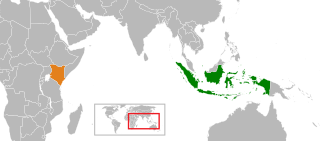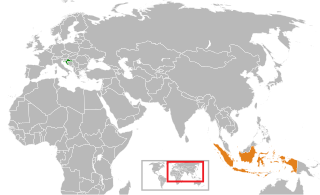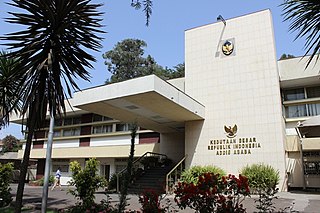
The foreign relations of Ethiopia refers to overall diplomatic relationship of Ethiopia. The Ministry of Foreign Affairs oversees foreign relations and diplomatic missions of the country.

Ethiopian–Turkish relations are foreign relations between Ethiopia and Turkey. Ethiopia has an embassy in Ankara and Turkey has an embassy in Addis Ababa. Turkey and Ethiopia have great relations, but Turkey has been more supportive of Somalia in the conflict.

The nations of Ethiopia and Mexico established diplomatic relations in 1949. Both nations are members of the Group of 24 and the United Nations.

Indonesia and South Africa established formal diplomatic relations on 12 August 1994. The South African Embassy in Jakarta was established in January 1995, and Indonesia opened its embassy in Pretoria in 1995. Both nations are members of numerous organizations such as the World Trade Organization (WTO), Non-Aligned Movement, Indian-Ocean Rim Association, Cairns Group, CIVETS and G-20 major economies. In 2012, during a briefing on Foreign Policy initiatives for 2012, Indonesia named South Africa amongst its 14 strategic partners and Dutch colonial period East Indies overseas countries.

Indonesia–North Korea relations refers to bilateral relations between Indonesia and North Korea. The two countries established diplomatic relations on 16 April 1964. Indonesia is one of the very few countries that still tries to maintain cordial relations with North Korea, despite the widespread international sanctions and resulting isolation imposed on North Korea, compounded with the negative reputation of its human rights, nuclear weapons and ballistic missile programs and Indonesia's publicly more robust engagement and partnership with South Korea.

Indonesia and Kenya established diplomatic relations on 15 October 1979. Indonesia has an embassy in Nairobi, also accredited to the Democratic Republic of the Congo, Somalia, and Uganda. On 18 March 2022, Kenya established its embassy in Jakarta. Both nations are partners in multilateral organizations, such as the World Trade Organization (WTO), Non-Aligned Movement and the Indian Ocean Rim Association.

Indonesia and Morocco established diplomatic relations in 1960. Both are the Muslim-majority countries; Indonesia is the most populous Muslim country in the world, while Morocco is also a Muslim majority nation. Morocco praised Indonesia as a strong democratic nation, and pointed out that both nations face the same challenges of separatism and terrorism. Diplomatic relations were established in 1960. Indonesia has an embassy in Rabat and a consulate in Casablanca, while Morocco has an embassy in Jakarta. Both nations are members of the World Trade Organization (WTO), Group of 77, Non-Aligned Movement and Organisation of Islamic Cooperation (OIC).

Cuba and Indonesia established diplomatic relations in 1960. During the administration of Indonesia's first president Sukarno in the 1960s, Indonesia and Cuba enjoyed an exceptionally close relationship. The relations between the two nations mostly focused on sports and health. Cuba has an embassy in Jakarta, while Indonesia has an embassy in Havana that is also accredited to the Commonwealth of the Bahamas and Jamaica. Both nations are full members of the Non-Aligned Movement and partners in the Group of 77 and the Forum of East Asia-Latin America Cooperation.

Indonesia and Venezuela established diplomatic relations in 1959. Since then, both countries enjoy friendly ties. Both nations agreed to expand the trade and investment relations, especially in tourism, technology, chemicals and natural gas sectors. Indonesia has an embassy in Caracas, while Venezuela has an embassy in Jakarta. Indonesia and Venezuela are members of multilateral organizations such as the World Trade Organization (WTO), Non-Aligned Movement and Forum of East Asia-Latin America Cooperation.

Algeria and Indonesia established diplomatic relations in 1963. The relationship is mostly founded on common religious and anti-colonialism solidarity, as Indonesia and Algeria are Muslim-majority countries that also once fell under colonialism. Algeria recognized Indonesia's role on supporting their country on gaining independence in 1962. Both countries agreed on expanding cooperations and strengthening relations. Algeria has an embassy in Jakarta that also accredited to Singapore and Brunei, while Indonesia has an embassy in Algiers. Both nations are members of the Non-Aligned Movement, Group of 77 and Organisation of Islamic Cooperation (OIC).

Austria and Indonesia established diplomatic relations on 20 November 1954. Austria recognizes Indonesia as a stable and reliable partner, and both countries enjoy excellent relations. The two nations have agreed to expand relations in business, trade and investment, tourism, culture, environment and green technology. Austria has an embassy in Jakarta and honorary consulates in Yogyakarta, Bandung and Surabaya, while Indonesia has an embassy in Vienna that is also accredited to Slovenia.

Indonesia and Peru established diplomatic relations in 1975. Both nations see each other as an attractive market with good prospects and potentials, and seeks to boost trade relations. Indonesia has an embassy in Lima, while Peru has an embassy in Jakarta. Indonesia and Peru are members of multilateral organizations such as the Asia-Pacific Economic Cooperation, the World Trade Organization (WTO), Non-Aligned Movement and Forum of East Asia-Latin America Cooperation.

Ecuador–Indonesia relations refer to bilateral relations between Ecuador and Indonesia. Relations were established on 29 April 1980; however, it was not until November 2004 that Ecuador established its embassy in Jakarta, and reciprocating 6 years later on November 11, 2010, that Indonesia finally opened its embassy in Quito. Both countries are the members of Forum of East Asia-Latin America Cooperation and Non-Aligned Movement.

Croatia and Indonesia established diplomatic relations in 1992. Croatia sees Indonesia as one of the largest and the most influential nation in ASEAN, and recognized its potential as the gate to enter ASEAN markets. Vice versa, Indonesia also recognizes Croatian potential as a strategic gate to penetrate Balkans and European Union market. Croatia has an embassy in Jakarta, while Indonesian embassy in Zagreb was established in 2010.

Indonesia–Mongolia relations refer to foreign relations between Indonesia and Mongolia since 1956. Both countries are members of the Asia Cooperation Dialogue, Forum of East Asia-Latin America Cooperation, Non-Aligned Movement, World Trade Organization and the United Nations.

The Embassy of the Republic of Indonesia in Addis Ababa is the diplomatic mission of the Republic of Indonesia to the Federal Democratic Republic of Ethiopia. The embassy is concurrently accredited to the Republic of Djibouti. In addition, the ambassador serves as the Indonesian representative for the African Union. The first Indonesian ambassador to Ethiopia was Suadi Soeromiharjo (1964–1968). The current ambassador, Al Busyra Basnur, was appointed by President Joko Widodo on 7 January 2019.

Cuba–Ethiopia relations refers to the bilateral relations between Cuba and Ethiopia. Both nations are members of the Non-Aligned Movement and the United Nations.

Indonesia–Mozambique relations are the bilateral relations between Indonesia and Mozambique. Both countries are members of the Non-Aligned Movement, Organization of Islamic Cooperation and the Indian-Ocean Rim Association.




















